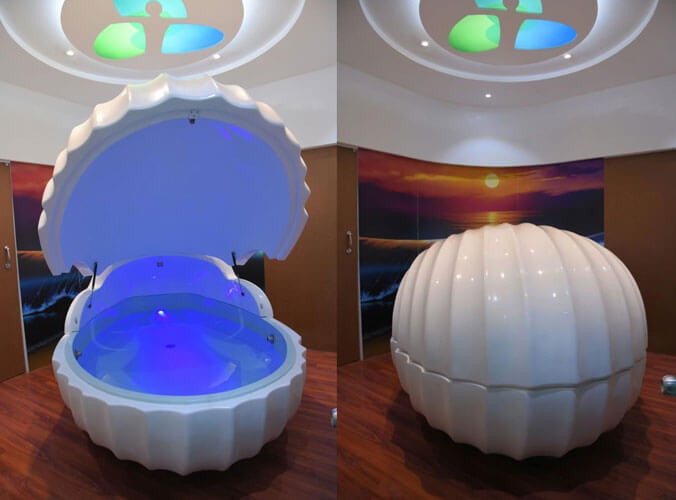With the rise of holistic health and natural wellness practices, float therapy sessions have emerged as one of the most powerful, drug-free ways to support both physical and mental health. From chronic pain relief to stress management, the health benefits of float therapy are broad, well-researched, and deeply impactful.
This blog explores how float session therapy supports your overall health. Whether you’re new to floating or a regular user looking to understand more, we’ll break down how this practice works, what the science says, and how you can make the most of float therapy services to improve your well-being.
What Is Float Therapy and How Does It Work?
Float therapy sessions take place in a sensory deprivation tank filled with warm water and a high concentration of Epsom salt (magnesium sulfate). The salt makes you effortlessly buoyant, while the water matches your body temperature. This creates a gravity-free environment where all sensory input sight, sound, touch is minimized.
Without external stimuli, your body and mind enter a deeply relaxed, meditative state. That’s where the powerful float session benefits begin.
Top Health Benefits of Float Therapy
1. Stress Reduction and Mental Clarity
Perhaps the most immediate benefit of float session therapy is stress relief. When you’re cut off from stimulation, your nervous system can finally rest.
- Lowers cortisol (the stress hormone)
- Activates the parasympathetic nervous system (“rest and digest” mode)
- Reduces symptoms of anxiety and burnout
Many users of float therapy services describe a sensation of complete calm and a “mental reset” after even one session.
Float Session Benefits: Lower stress levels, emotional clarity, mental calmness
2. Pain Relief and Muscle Recovery
Float therapy sessions are especially beneficial for people dealing with:
- Chronic pain (fibromyalgia, arthritis, back pain)
- Sports injuries or workout recovery
- Muscle tension and inflammation
The Epsom salt allows magnesium to absorb through the skin, relaxing muscles and reducing inflammation. The zero-gravity effect also relieves pressure on joints and the spine.
Float Session Benefits: Reduced pain, faster healing, better joint mobility
3. Improved Sleep Quality
Sleep disorders like insomnia and poor sleep hygiene are increasingly common. Float therapy has been shown to improve sleep by:
- Reducing nervous system overactivity
- Lowering nighttime cortisol levels
- Helping you enter deep rest states more easily
Regular float therapy sessions can significantly improve your sleep cycles, helping you feel refreshed and alert during the day.
Float Session Benefits: Deeper sleep, less fatigue, better sleep-wake rhythm
4. Enhanced Mental Health
Studies show that float therapy services offer support for mental health issues such as:
- Anxiety disorders
- Depression
- PTSD
- ADHD
The combination of sensory isolation and physical relaxation helps quiet the mind and regulate emotional responses. People often report feeling more grounded and emotionally balanced after a session.
Float Session Benefits: Emotional resilience, reduced anxiety, fewer depressive symptoms
5. Detoxification and Immune Support
While floating isn’t a detox cure-all, it does support:
- Lymphatic drainage (due to improved circulation)
- Magnesium absorption, which plays a role in over 300 enzymatic processes
- Reduced inflammation, leading to stronger immune responses
Float therapy services often work in conjunction with other detox or immune-boosting programs for amplified results.
Float Session Benefits: Enhanced immune function, better detox pathways, reduced swelling
6. Cardiovascular Health
Research suggests that float session therapy can positively affect heart health by:
- Lowering blood pressure
- Slowing heart rate
- Improving blood vessel function
These benefits are attributed to reduced stress hormones and parasympathetic nervous system activation. For those with high blood pressure or cardiovascular concerns, float therapy sessions can be a gentle, non-invasive complement to medical care.
Float Session Benefits: Lower risk of heart disease, improved circulation
7. Cognitive Performance and Focus
The sensory-deprived state of a float tank can sharpen your thinking by:
- Increasing theta brainwaves (linked with focus and creativity)
- Enhancing problem-solving abilities
- Boosting short- and long-term memory
Professionals, students, and creatives often turn to float therapy services for mental enhancement before big projects or events.
Float Session Benefits: Better focus, improved productivity, creative breakthroughs
8. Support for Addiction Recovery
While not a replacement for professional treatment, float session therapy is increasingly used in addiction recovery programs to:
- Reduce cravings and withdrawal symptoms
- Increase self-awareness and emotional regulation
- Support the rebuilding of healthy habits and mental clarity
The safe, calm environment of a float tank helps recovering individuals face emotional discomfort in a manageable way.
Float Session Benefits: Less anxiety during recovery, improved mindfulness, greater emotional control
What Does the Research Say?
Numerous studies have explored the health benefits of float therapy services. Here are some highlights:
- A 2018 study published in PLOS ONE showed that just one 60-minute float significantly reduced symptoms of anxiety and depression in high-stress individuals.
- A 2014 Swedish study demonstrated that chronic pain sufferers experienced less pain and increased energy after a series of float therapy sessions.
- Research from the Journal of Complementary & Behavioral Medicine found that float therapy decreased blood pressure and improved sleep patterns in adults with insomnia.
The research backs up what many users have discovered: float session therapy is not just relaxing—it’s a powerful tool for real health improvement.
Who Should Consider Float Therapy for Health Benefits?
Float therapy services can benefit a wide range of people:
| Condition / Goal | Why Float Therapy Helps |
| Chronic pain | Reduces pressure and inflammation |
| Anxiety and depression | Lowers cortisol, improves mood |
| Athletes and fitness enthusiasts | Accelerates recovery and reduces soreness |
| Sleep disorders | Promotes deeper, more restorative rest |
| Busy professionals | Boosts focus, clears mental fatigue |
| Seniors or those with arthritis | Relieves joint pain, improves flexibility |
| Creative professionals | Sparks ideas through enhanced theta brainwave activity |
How Often Should You Float for Health Benefits?
The frequency of float therapy sessions depends on your goals:
| Health Goal | Recommended Frequency |
| Stress & anxiety relief | Weekly or bi-weekly |
| Chronic pain management | 1–2 times per week |
| Mental clarity & focus | Weekly |
| Athletic recovery | After training sessions |
| General wellness | 2–4 sessions per month |
Many float therapy services offer packages and memberships to support regular sessions and long-term wellness.
FAQs About Float Therapy and Health
Q1: Can float therapy cure health conditions?
Float therapy isn’t a cure, but it’s a powerful supportive tool. Always use it alongside proper medical care, especially for serious or chronic conditions.
Q2: Is float therapy safe for everyone?
Float therapy is generally safe, but consult your doctor if you have epilepsy, low blood pressure, kidney issues, or are pregnant.
Q3: How soon will I notice health benefits?
Some benefits like stress relief are felt immediately. Others—like pain reduction or improved sleep—may take 2–4 sessions to become noticeable.
Q4: Are there any side effects?
Most people feel calm and refreshed. Some may feel disoriented or dizzy for a short time after their first float therapy session—this usually fades quickly.
Q5: Is floating more effective than other wellness practices?
It depends on your goals. For many, float session therapy delivers faster and deeper results than practices like massage, yoga, or meditation alone.
Conclusion: Invest in Your Health with Float Therapy
Health isn’t just about avoiding illness it’s about creating balance, reducing stress, and supporting your body’s natural healing systems. Float therapy services offer a unique, science-backed way to do just that.
From stress relief and improved sleep to pain reduction and emotional regulation, the float session benefits speak for themselves. Whether you’re an athlete, a business owner, a parent, or simply someone who wants to feel better, float therapy sessions provide an opportunity to reconnect with your health—on your terms.
If you’re ready to feel lighter, clearer, and healthier, it might be time to float your way to better living.





